 W
WThis article is a list of songs written by Irving Berlin. It is arranged in alphabetical order, but can be rearranged in chronological order by clicking at the top of that column. You may also click twice at the top of the "click to play" column, to bring those items to the top of the list. Furthermore, you can click on the last column to bring to the top those songs that have Wikipedia articles about them.
 W
W"Alexander's Ragtime Band" is a Tin Pan Alley song by American composer Irving Berlin released in 1911 and is often inaccurately cited as his first global hit. Although not a traditional ragtime song, Berlin's jaunty melody nonetheless "sold a million copies of sheet music in 1911, then another million in 1912, and continued to sell for years afterward. It was the number one song from October 1911 through January 1912." The song might be regarded as a narrative sequel to "Alexander and His Clarinet," which Berlin wrote with Ted Snyder in 1910. The earlier song is mostly concerned with a reconciliation between an African-American musician named Alexander Adams and his flame Eliza Johnson, but also highlights Alexander's innovative musical style.
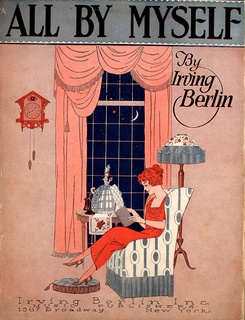 W
W"All by Myself" is a popular song written by Irving Berlin, published in 1921.
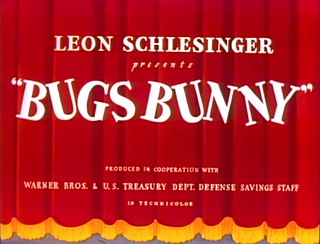 W
W"Any Bonds Today?" is a song written by Irving Berlin, featured in a 1942 animated propaganda film starring Bugs Bunny. Both were used to sell war bonds during World War II.
 W
WHoliday Inn is a 1942 American musical film directed by Mark Sandrich and starring Bing Crosby and Fred Astaire, with Marjorie Reynolds, Virginia Dale, and Walter Abel. With music by Irving Berlin, the composer wrote twelve songs specifically for the film, the best known being "White Christmas". The film features a complete reuse of the song "Easter Parade", written by Berlin for the 1933 Broadway revue As Thousands Cheer. The film's choreography was by Danny Dare.
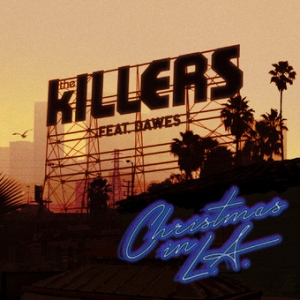 W
W"Christmas in L.A." is a song by Las Vegas-based rock band The Killers featuring Dawes, released on December 1, 2013. The song marks the eighth consecutive year in which the band has released a Christmas song. As with their seven previous releases, all proceeds from this song goes to AIDS charities as part of the Product Red campaign. The song was written by Brandon Flowers and Mark Stoermer of The Killers and Taylor Goldsmith from Dawes. Irving Berlin also has a writing credit due to the song featuring lyrics from "White Christmas".
 W
WAnnie Get Your Gun is a musical with lyrics and music by Irving Berlin and a book by Dorothy Fields and her brother Herbert Fields. The story is a fictionalized version of the life of Annie Oakley (1860–1926), a sharpshooter who starred in Buffalo Bill's Wild West, and her romance with sharpshooter Frank E. Butler (1847–1926).
 W
W"We're a Couple of Swells" is an American comedy duet song performed by Judy Garland and Fred Astaire in the film Easter Parade (1948). It was written by Irving Berlin. Berlin originally wrote the song Let's Take an Old-Fashioned Walk for the scene but the film's producer, Arthur Freed, convinced Berlin to change this for a song that would highlight Garland's comedic talent. Berlin wrote the song in about an hour drawing on his experience as a Tin Pan Alley popular songwriter.
 W
WDaddy, Come Home is a song written by Irving Berlin and first published in 1913.The humorous song begins "Hello Central, dear Central, listen here: please connect me with my father" and tells the story from the point of view of a young boy calling his father on the telephone to ask him to leave work and deal with an assortment of family problems at home.
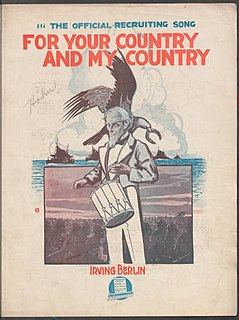 W
W"For Your Country and My Country" is a World War I era song released in 1917. Lyrics and music were written by Irving Berlin. The song was published by Waterson, Berlin & Snyder, Co. of New York, New York. Artist Albert Wilfred Barbelle designed the sheet music cover. It features Uncle Sam playing a snare drum with an eagle on his shoulder. In the background are ships sailing, and below are troops marching. Above the title, it reads, "The Official Recruiting Song." The song was written for voice and piano, along with chords for guitar, ukulele, and banjo.
 W
WI Want to Go Back to Michigan is a song by Irving Berlin composed in 1914. It was a moderate commercial success when it was first released with popular versions by Elida Morris and by Morton Harvey. Afterwards it became a staple on vaudeville. Its most famous performance was by Judy Garland in the film Easter Parade.
 W
WAnnie Get Your Gun is a musical with lyrics and music by Irving Berlin and a book by Dorothy Fields and her brother Herbert Fields. The story is a fictionalized version of the life of Annie Oakley (1860–1926), a sharpshooter who starred in Buffalo Bill's Wild West, and her romance with sharpshooter Frank E. Butler (1847–1926).
 W
WI'm Gonna Pin My Medal on the Girl I Left Behind is a World War I era song about a soldier named Johnny dreaming of coming home and giving his medal to his sweetheart. The song was first featured in Ziegfeld Follies of 1918. It reached the top 20 in August 1918 and climbed even higher to number 14 in September 1918. It was written and composed by Irving Berlin, produced by Waterson, Berlin & Snyder Co., and recorded by the Peerless Quartet.
 W
W"I've Got My Captain Working for Me Now" is a popular song written in 1919 by Irving Berlin. It was published by Music Publishers Inc. in New York, New York.
 W
WIrving Berlin's 100th Birthday Celebration was a concert special held in his honor at Carnegie Hall on May 11, 1988. It was aired on CBS television two weeks later, on May 27. At the 40th annual Emmy Awards later that summer, on August 28, it won two Emmys for outstanding variety, music or comedy program. Berlin himself did not attend, as he had retired from public life.
 W
W"Mandy" is a popular song by Irving Berlin, published in 1919.
 W
WIrving Berlin was an American composer and lyricist, widely considered one of the greatest songwriters in American history. His music forms a great part of the Great American Songbook. Born in Imperial Russia, Berlin arrived in the United States at the age of five. He published his first song, "Marie from Sunny Italy", in 1907, receiving 33 cents for the publishing rights, and had his first major international hit, "Alexander's Ragtime Band", in 1911. He also was an owner of the Music Box Theatre on Broadway. It is commonly believed that Berlin could not read sheet music, and was such a limited piano player that he could only play in the key of F-sharp using his custom piano equipped with a transposing lever.
 W
W"Oh! How I Hate to Get Up in the Morning" is a song written by Irving Berlin in 1918 that gives a comic perspective on military life. Berlin composed the song as an expression of protest against the indignities of Army routine shortly after being drafted into the United States Army in 1918. The song soon made the rounds of camp and became popular with other soldiers, partly because hatred of reveille was universal.
 W
WAnnie Get Your Gun is a musical with lyrics and music by Irving Berlin and a book by Dorothy Fields and her brother Herbert Fields. The story is a fictionalized version of the life of Annie Oakley (1860–1926), a sharpshooter who starred in Buffalo Bill's Wild West, and her romance with sharpshooter Frank E. Butler (1847–1926).
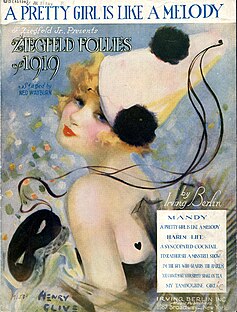 W
W"A Pretty Girl Is Like A Melody" is a popular song written by Irving Berlin in 1919 which became the theme song of the Ziegfeld Follies. The first verse and refrain are considered part of the Great American Songbook and are often covered as a jazz standard.
 W
W"Puttin' On the Ritz" is a song written by Irving Berlin. He wrote it in May 1927 and first published it on December 2, 1929. It was registered as an unpublished song August 24, 1927 and again on July 27, 1928. It was introduced by Harry Richman and chorus in the musical film Puttin' On the Ritz (1930). According to The Complete Lyrics of Irving Berlin, this was the first song in film to be sung by an interracial ensemble. The title derives from the slang expression "to put on the Ritz", meaning to dress very fashionably. This expression was itself inspired by the opulent Ritz Hotel in London.
 W
W"The Ragtime Soldier Man" is a World War I era song released in 1912 and 1917. Irving Berlin wrote the lyrics and composed the music. The song was published by Waterson, Berlin & Snyder, Co. of New York, New York. Artist Pfeiffer designed the sheet music cover. It features a U.S. soldier holding his rifle and jumping over cannon balls. The song was written for voice and piano.
 W
W"San Francisco Bound" is a song by Irving Berlin, published by the Berlin & Snyder Company in 1913. The sheet music's cover proclaims that it was "successfully featured by Amy Butler". A recording by the Peerless Quartet was popular in 1913.
 W
W"Someone Else May Be There While I'm Gone" is a World War I era song written by Irving Berlin and published as sheet music in 1917. The song, recorded by Al Jolson for Columbia Records on September 19, 1916 was very popular that year. Jolson recorded it again for Decca Records on December 5, 1947.
 W
W"Stay Down Here Where You Belong" was a pacifist song written by Irving Berlin in 1914. The lyrics depict a conversation between the devil and his son, the devil exhorting him to "stay down here where you belong" because people on Earth do not know right from wrong.
 W
W"That International Rag" is a song composed by Irving Berlin in 1913. Berlin wrote the song the night before its debut, when he needed a new opening number for his act while on tour in England.
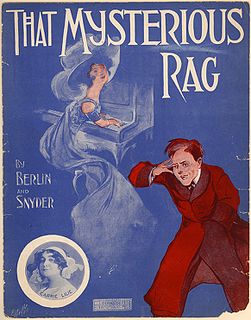 W
W"That Mysterious Rag" is a song by Irving Berlin and Ted Snyder written in 1911. It was one of the earliest Berlin songs to become a commercial success with recordings by Arthur Collins & Albert Campbell and by the American Quartet being very popular in 1912.
 W
W"They Were All Out of Step But Jim" is an American World War I war song. It rose to popularity in 1918 when released by Billy Murray, charting at #3 in the United States.
 W
W"When I Lost You" is a song with music and lyrics by Irving Berlin. It was written in 1912 after his wife of five months, the former Dorothy Goetz, died of typhoid fever. In it he poured out the grief of his loss; it was the only song that he ever admitted had such a connection to his own life. The song, a ballad, was unlike any of Berlin's previous songs, which were upbeat tunes written to take advantage of the dance craze. The song is in a slow waltz tempo. It became Berlin's first hit ballad.
 W
W"White Christmas" is an Irving Berlin song reminiscing about an old-fashioned Christmas setting, released in 1942. The version sung by Bing Crosby is the world's best-selling single with estimated sales in excess of 50 million copies worldwide. When the figures for other versions of the song are added to Crosby's, sales of the song exceed 100 million.
 W
WAnnie Get Your Gun is a musical with lyrics and music by Irving Berlin and a book by Dorothy Fields and her brother Herbert Fields. The story is a fictionalized version of the life of Annie Oakley (1860–1926), a sharpshooter who starred in Buffalo Bill's Wild West, and her romance with sharpshooter Frank E. Butler (1847–1926).